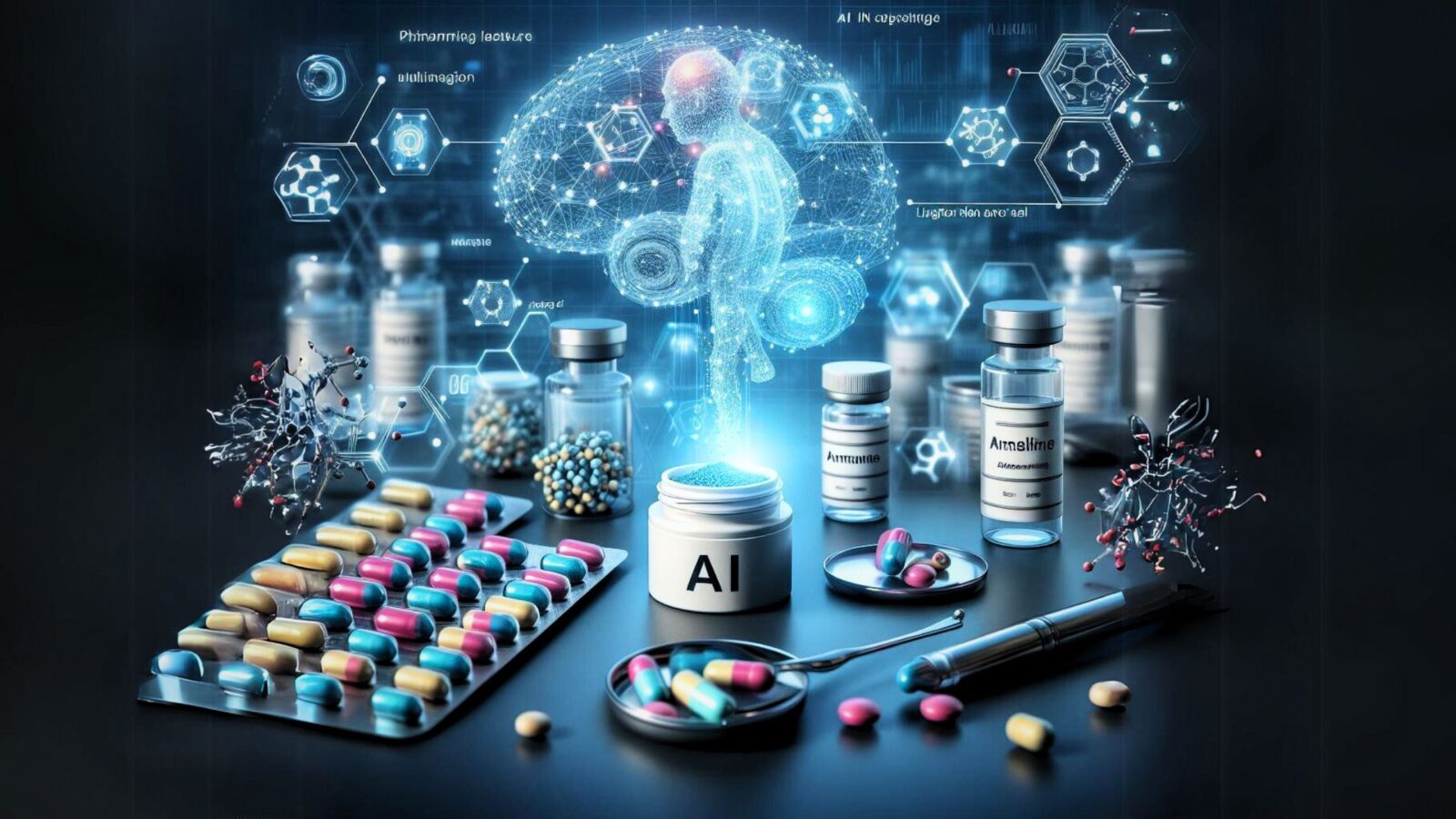
-
Table of Contents
“Revolutionizing Drug Discovery: Unleashing the Power of Artificial Intelligence”
Artificial Intelligence (AI) has revolutionized various industries, and the field of drug discovery and development is no exception. With its ability to analyze vast amounts of data and perform complex tasks, AI has become an invaluable tool in accelerating the drug discovery process. By leveraging machine learning algorithms, AI can predict drug-target interactions, identify potential drug candidates, optimize drug design, and even assist in clinical trials. These applications of AI in drug discovery and development hold immense promise for improving the efficiency and effectiveness of the pharmaceutical industry, ultimately leading to the development of safer and more effective drugs.
The Role of Artificial Intelligence in Accelerating Drug Discovery
Artificial Intelligence (AI) has emerged as a powerful tool in various industries, and its potential in drug discovery and development is no exception. The traditional drug discovery process is time-consuming, expensive, and often yields limited success. However, with the integration of AI, researchers are now able to accelerate the discovery of new drugs, leading to more efficient and effective treatments for various diseases.
One of the key roles of AI in drug discovery is in the identification of potential drug targets. AI algorithms can analyze vast amounts of biological data, including genetic information, protein structures, and disease pathways, to identify specific molecules or proteins that could be targeted by drugs. This process, known as target identification, allows researchers to focus their efforts on the most promising candidates, saving time and resources.
Once potential drug targets have been identified, AI can also assist in the design and optimization of drug molecules. Through machine learning algorithms, AI can analyze large databases of chemical compounds and predict their properties, such as their ability to bind to a specific target or their potential toxicity. This enables researchers to prioritize and select the most promising drug candidates for further development, increasing the chances of success.
In addition to target identification and molecule design, AI can also play a crucial role in the optimization of drug dosing and formulation. By analyzing patient data, including genetic information, medical history, and response to treatment, AI algorithms can predict the optimal dosage and formulation of a drug for individual patients. This personalized approach to drug dosing can improve treatment outcomes and reduce the risk of adverse effects.
Furthermore, AI can enhance the efficiency of clinical trials, a critical step in the drug development process. By analyzing patient data and historical trial data, AI algorithms can identify patient populations that are more likely to respond positively to a particular drug. This allows researchers to design more targeted and efficient clinical trials, reducing costs and time required for drug approval.
Another area where AI can make a significant impact is in the prediction of drug safety and toxicity. Traditional methods for assessing drug safety often rely on animal testing, which can be time-consuming, expensive, and ethically challenging. AI algorithms can analyze large datasets of chemical and biological information to predict the safety profile of a drug, including its potential for adverse effects. This can help researchers identify potential safety concerns early in the drug development process, saving time and resources.
Overall, the integration of AI in drug discovery and development has the potential to revolutionize the pharmaceutical industry. By accelerating the identification of drug targets, optimizing molecule design, personalizing dosing, improving clinical trial efficiency, and predicting drug safety, AI can significantly enhance the efficiency and success rate of drug discovery. However, it is important to note that AI is not a replacement for human expertise and judgment. Rather, it is a powerful tool that can augment and support the work of researchers, ultimately leading to the development of safer and more effective drugs for patients in need.
How Artificial Intelligence is Revolutionizing Drug Development Processes
Artificial Intelligence Applications in Drug Discovery and Development
Artificial Intelligence (AI) has emerged as a powerful tool in various industries, and the field of drug discovery and development is no exception. With its ability to analyze vast amounts of data and identify patterns, AI is revolutionizing the drug development process. This article explores how AI is transforming drug development processes and the potential benefits it offers.
One of the key areas where AI is making a significant impact is in the identification of potential drug targets. Traditionally, this process involved extensive experimentation and trial and error. However, AI algorithms can now analyze large datasets and identify potential targets with a higher degree of accuracy. By analyzing genetic and molecular data, AI can identify specific proteins or genes that play a crucial role in disease progression. This enables researchers to develop targeted therapies that can effectively treat the underlying cause of the disease.
Another area where AI is proving invaluable is in the prediction of drug efficacy and toxicity. AI algorithms can analyze vast amounts of data from clinical trials, preclinical studies, and other sources to predict how a drug will interact with the human body. This allows researchers to identify potential side effects or drug interactions before they occur, saving both time and resources. By predicting drug efficacy, AI can also help researchers prioritize the most promising drug candidates for further development, increasing the chances of success.
AI is also being used to accelerate the process of drug discovery. Traditional drug discovery involves screening thousands or even millions of compounds to identify potential drug candidates. This process is time-consuming and costly. However, AI algorithms can analyze chemical structures and predict their potential biological activity. This enables researchers to narrow down the pool of potential drug candidates, saving time and resources. AI can also suggest modifications to existing compounds to enhance their efficacy or reduce their toxicity, further speeding up the drug discovery process.
Furthermore, AI is playing a crucial role in personalized medicine. By analyzing patient data, including genetic information, medical history, and lifestyle factors, AI algorithms can identify the most effective treatment options for individual patients. This allows for more targeted and personalized therapies, improving patient outcomes and reducing the risk of adverse reactions. AI can also help identify patients who are more likely to respond to a particular treatment, enabling more efficient clinical trials and reducing the overall cost of drug development.
Despite the numerous benefits AI offers in drug discovery and development, there are also challenges that need to be addressed. One of the main challenges is the need for high-quality data. AI algorithms rely on large datasets to make accurate predictions. However, the availability of high-quality data is often limited, especially in the field of drug development. Additionally, there are ethical considerations surrounding the use of AI in healthcare, including issues of privacy and data security.
In conclusion, AI is revolutionizing the drug development process by enabling more efficient and targeted approaches. From identifying potential drug targets to predicting drug efficacy and toxicity, AI is transforming the way drugs are discovered and developed. With its ability to analyze vast amounts of data and identify patterns, AI offers the potential to accelerate the drug development process, reduce costs, and improve patient outcomes. However, addressing challenges such as data quality and ethical considerations is crucial to fully harness the potential of AI in drug discovery and development.
Applications of Artificial Intelligence in Predicting Drug Efficacy and Safety
Artificial Intelligence (AI) has revolutionized various industries, and the field of drug discovery and development is no exception. With its ability to analyze vast amounts of data and identify patterns, AI has become an invaluable tool in predicting drug efficacy and safety. This article explores the applications of AI in this crucial aspect of pharmaceutical research.
One of the primary challenges in drug discovery is identifying potential drug candidates that are both effective and safe. Traditionally, this process involved extensive experimentation and testing, which was not only time-consuming but also costly. However, AI has transformed this process by enabling researchers to predict the efficacy and safety of potential drugs through computational models.
AI algorithms can analyze large datasets containing information about the chemical structures of various compounds, their biological activities, and their interactions with target molecules. By identifying patterns and correlations within this data, AI algorithms can predict the efficacy of a drug candidate in targeting a specific disease. This allows researchers to prioritize the most promising candidates for further investigation, saving time and resources.
Moreover, AI can also predict the safety profile of potential drugs. By analyzing data on the adverse effects of existing drugs, AI algorithms can identify patterns that indicate potential safety concerns. This enables researchers to identify and eliminate drug candidates with a high risk of adverse effects early in the development process, reducing the likelihood of costly failures in later stages.
One of the most significant advantages of using AI in predicting drug efficacy and safety is its ability to consider a wide range of factors simultaneously. Traditional methods often focus on a limited number of variables, which may overlook crucial interactions and lead to inaccurate predictions. AI algorithms, on the other hand, can analyze multiple variables simultaneously, including genetic factors, environmental factors, and patient characteristics. This holistic approach provides a more comprehensive understanding of the complex factors that influence drug efficacy and safety.
Furthermore, AI can also leverage data from clinical trials to refine its predictions. By analyzing data from patients who have participated in clinical trials, AI algorithms can identify patterns that correlate with treatment response and adverse effects. This allows researchers to refine their predictions and tailor treatments to individual patients, maximizing efficacy while minimizing the risk of adverse effects.
The applications of AI in predicting drug efficacy and safety extend beyond the early stages of drug discovery. AI algorithms can also analyze real-world data, such as electronic health records and patient-reported outcomes, to monitor the long-term efficacy and safety of approved drugs. This real-time monitoring allows researchers to identify potential safety concerns and make informed decisions about drug usage.
In conclusion, AI has revolutionized the field of drug discovery and development by enabling researchers to predict drug efficacy and safety. By analyzing vast amounts of data and identifying patterns, AI algorithms can prioritize the most promising drug candidates, predict potential safety concerns, and tailor treatments to individual patients. This not only saves time and resources but also improves patient outcomes by ensuring the development of effective and safe drugs. As AI continues to advance, its applications in drug discovery and development are likely to expand, further revolutionizing the pharmaceutical industry.In conclusion, Artificial Intelligence (AI) applications have shown great potential in drug discovery and development. AI algorithms can analyze vast amounts of data, identify patterns, and predict the efficacy and safety of potential drug candidates. This technology has the ability to accelerate the drug discovery process, reduce costs, and improve success rates. Additionally, AI can aid in personalized medicine by analyzing patient data to develop tailored treatment plans. While there are still challenges to overcome, such as data quality and regulatory considerations, the integration of AI in drug discovery and development holds promise for revolutionizing the pharmaceutical industry.








